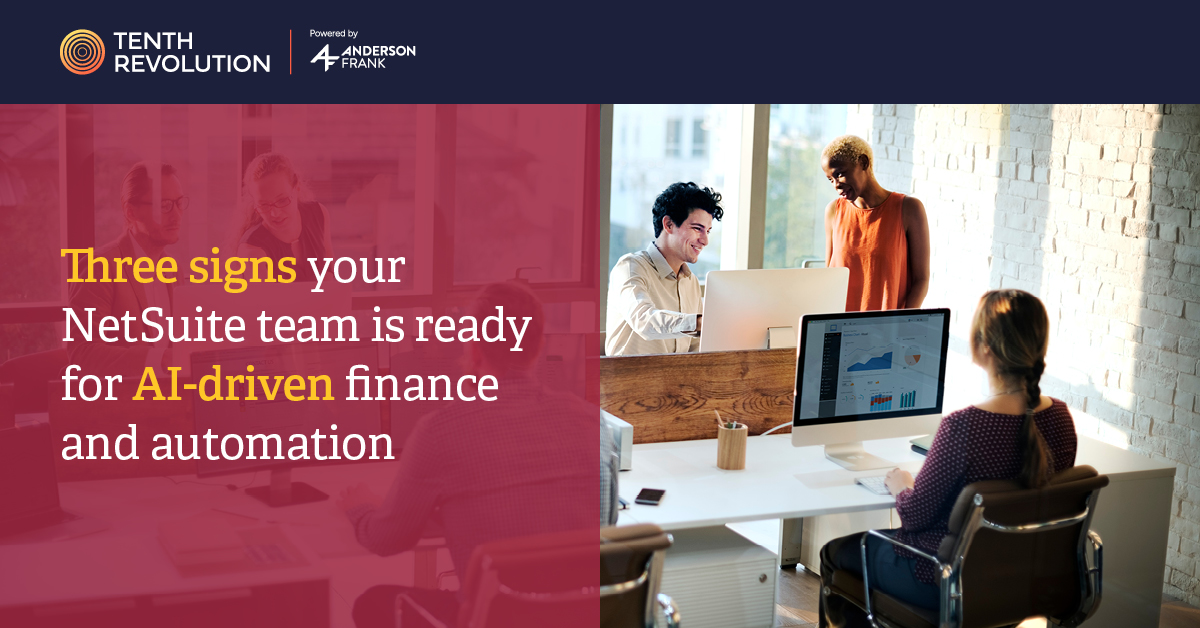
AI-driven finance isn’t a future concept. It’s already reshaping how CFOs manage forecasting, close cycles, and operational efficiency within NetSuite.
From predictive analytics to automated workflows, finance teams now have the tools to turn data into faster and more accurate decisions. But as these capabilities expand, success depends less on the technology itself and more on the readiness of the team using it.
Being “AI-ready” doesn’t mean hiring a department full of data scientists. It means building teams that can understand, translate, and operationalize automation in ways that improve business outcomes.
Here are three signs your NetSuite team is prepared to make that shift…
1. Your team can interpret automation, not just operate it
Finance and operations staff who can translate AI output into business insight are quickly becoming essential. NetSuite’s embedded automation now supports transaction categorization, anomaly detection, and predictive forecasting. Yet these tools are only valuable if the people using them understand what the results mean for revenue, cash flow, or pipeline health.
An AI-literate finance professional can identify when an automated process needs refinement, explain why an AI-generated forecast varies from historical trends, and communicate those findings to leadership. They do not need to be data scientists, but they must understand how data quality, context, and human judgment work together.
The most effective finance teams blend business intuition with automation awareness. They view AI as a partner in decision-making rather than a black box. When that mindset takes hold, the organization starts to move faster, with greater confidence in its data-driven insights.
The technology is advancing quickly, but results depend on people. Anderson Frank connects you with NetSuite professionals with finance experience, who can apply automation intelligently, ensuring that AI supports rather than complicates financial control.
2. Continuous learning is built into your culture
As AI and automation evolve, so do the skills required to manage them. Finance professionals need ongoing learning opportunities to stay fluent in emerging tools and processes. Teams that prioritize upskilling and certification see faster adoption of automation and fewer implementation bottlenecks.
NetSuite has been modernizing its own certification structure around role-based learning paths, giving finance, operations, and technical users specific skill routes tailored to their responsibilities. This shift aligns closely with what forward-thinking employers are doing internally: funding training and continuous validation to close the skills gap.
According to the Anderson Frank Careers and Hiring Guide, 73% of employers pay at least in part for their NetSuite staff to earn certifications. This trend highlights a shared understanding that staying current is no longer optional.
For CFOs, fostering this culture of continuous learning signals real AI readiness. It means employees are equipped to adapt to change, adopt new tools quickly, and maintain compliance as automation reshapes how finance operates.
Upskilling takes investment, but it pays off in speed and confidence. Anderson Frank can help with hiring experienced NetSuite professionals with proven records in automation or AI integration, so your internal teams learn faster and accelerate adoption.
3. Finance and IT collaborate around shared outcomes
The most AI-ready organizations treat automation as a cross-functional initiative, not an isolated project. Finance and IT teams must work together to align data quality, governance, and automation design.
When finance owns the business logic and IT provides the technical framework, automation becomes reliable and auditable. Both functions understand what the system is doing and why. This collaboration is essential for compliance, especially when AI is influencing decisions tied to audit controls or financial reporting.
A strong example is how some enterprises are approaching AI-driven forecasting. Finance defines the performance indicators and thresholds, while IT ensures the models run securely within NetSuite’s architecture. Together, they produce reliable forecasts that leadership can act on.
This partnership extends to data management too. Clean, well-governed data ensures AI-generated insights are accurate and explainable. Without this foundation, automation risks introducing errors instead of eliminating them.
Enterprises that succeed with AI-enabled NetSuite operations are those where finance and IT share accountability for automation outcomes. That collaboration not only speeds up adoption but also strengthens trust across departments.
Measuring AI readiness
AI-driven finance is as much about mindset as it is about infrastructure. If your team can interpret automation, commits to continuous learning, and collaborates effectively across functions, you already have the foundation for success.
The next step is to identify gaps. Are there roles where automation is underused? Do employees feel confident questioning or refining AI outputs? Can your finance leaders articulate how automation contributes to KPIs like forecast accuracy or close speed?
Answering those questions honestly will help define your next hiring priorities. Building a truly AI-ready finance team requires talent that can blend system fluency with strategic insight



